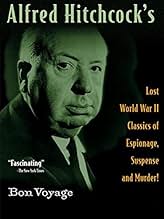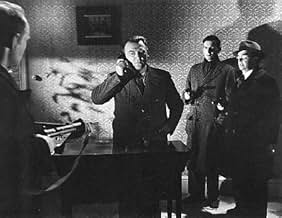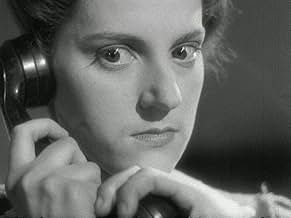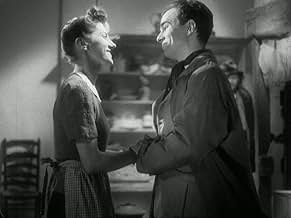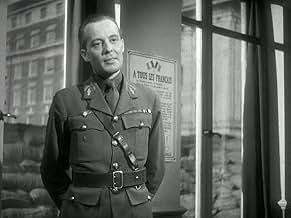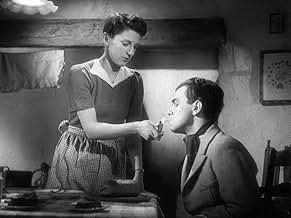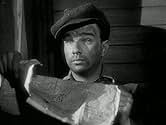IMDb RATING
6.1/10
2.1K
YOUR RATING
A young Scottish R. A. F. Gunner is debriefed by French officials about his escape from occupied territory, and in particular one person who may or may not have been a German Agent.A young Scottish R. A. F. Gunner is debriefed by French officials about his escape from occupied territory, and in particular one person who may or may not have been a German Agent.A young Scottish R. A. F. Gunner is debriefed by French officials about his escape from occupied territory, and in particular one person who may or may not have been a German Agent.
- Director
- Writers
- Stars
- Director
- Writers
- All cast & crew
- Production, box office & more at IMDbPro
Featured reviews
"Bon Voyage" is a very short propaganda film about the French resistance which Hitchcock did for the war effort in 1944. It was met with disappointment and later shelved.
The only person billed is John Blythe; the rest are called "The Moliere Players" to protect them from the Nazis.
Blythe plays a Scottish RAF Sgt. John Dougall. He is being debriefed about his escape from France by French intelligence officers in London.
Dougall has escaped from a prisoner of war camp along with Stefan Godowski, who actually put the plan together. The two stick together until there is a Resistance-aided pick-up in France by plane. But only one can go, so they shoot dice for it. Dougall is the one to leave.
Upon meeting with the Intelligence agents, Dougall says that he hopes Godowski made it and wants to know what happened. As it turns out, although the agents wanted Dougall's story about how he was helped along the way, they already knew it.
Good story, but it was too low-key for what the government wanted from Hitchcock - a real rah-rah story and big ending concerning the Resistance.Instead, it showed ordinary people taking risks, which I found moving and effective.
An old woman I knew was in Vienna studying just before the war broke out and, for academic reasons, went looking for Heinrich Mann, who was hiding out in France. (And I just saw a film about this very thing, Varian's War). On the beach, she saw a man and woman playing ball on the beach, and the ball kept landing near her. They turned out to be members of the Resistance.
I believe she did find Mann in a bar somewhere, but what impressed her (and me) is that this couple told her that they would never quit their work until Nazism was defeated.
In the end, I think Hitchcock told the right story. It's not the big triumph but the work that people do leading up to it, sometimes small things, that win a war.
The only person billed is John Blythe; the rest are called "The Moliere Players" to protect them from the Nazis.
Blythe plays a Scottish RAF Sgt. John Dougall. He is being debriefed about his escape from France by French intelligence officers in London.
Dougall has escaped from a prisoner of war camp along with Stefan Godowski, who actually put the plan together. The two stick together until there is a Resistance-aided pick-up in France by plane. But only one can go, so they shoot dice for it. Dougall is the one to leave.
Upon meeting with the Intelligence agents, Dougall says that he hopes Godowski made it and wants to know what happened. As it turns out, although the agents wanted Dougall's story about how he was helped along the way, they already knew it.
Good story, but it was too low-key for what the government wanted from Hitchcock - a real rah-rah story and big ending concerning the Resistance.Instead, it showed ordinary people taking risks, which I found moving and effective.
An old woman I knew was in Vienna studying just before the war broke out and, for academic reasons, went looking for Heinrich Mann, who was hiding out in France. (And I just saw a film about this very thing, Varian's War). On the beach, she saw a man and woman playing ball on the beach, and the ball kept landing near her. They turned out to be members of the Resistance.
I believe she did find Mann in a bar somewhere, but what impressed her (and me) is that this couple told her that they would never quit their work until Nazism was defeated.
In the end, I think Hitchcock told the right story. It's not the big triumph but the work that people do leading up to it, sometimes small things, that win a war.
One of two French films Hitchcock made, both during WWII, both propaganda efforts (but not the nasty sort), "Bon Voyage" is a 26 minute long espionage thriller with a mostly uninspired script. It's not a lot of fun to sit through and only really worthwhile for Hitchcock fans or completists... His work here is solid but not remarkable in any way, and while the story is reasonably engaging and the acting good it's all a rather uninspiring and lacking affair. The script's probably to blame, as it's no fun at all when it really should be. A bit of a chore to sit through, to be completely honest.
5/10
5/10
"Bon Voyage" was one of two short French language propaganda films made by Alfred Hitchcock for the British Ministry of Information in 1944, the other being "Aventure Malgache". The film depicts the escape of a downed Royal Air Force air gunner through German-occupied France, with the assistance of Resistance fighters. The purpose was presumably to inform French exiles in Britain and America, and those living in territory controlled by the Free French Government, of the work being done, and the sacrifices being made, by their compatriots in the Resistance.
The film is very short, at only 26 minutes long, and today is likely to be principally of interest to Hitchcock completists. It does, however, have its points of interest, notably its use of multiple viewpoints of the same events, a technique that looks forward to later films such as Kurosawa's "Rashomon". We see the airman being debriefed by a Free French intelligence officer in London and quickly realise that the intelligence officer knows things about the escape that the young man himself is unaware of, especially that he has been an unwitting pawn in a German scheme for getting information to one of their agents in Britain. Another theme of the film is a warning to the French to be on their guard against the dirty tricks of the Germans and their Vichy French collaborators.
"Bon Voyage" was presumably intended principally as a propaganda film rather than as dramatic entertainment; had it been intended as the latter, it would have needed to have been at least three times as long. This is the reason why I have not awarded it a mark out of ten.
The film is very short, at only 26 minutes long, and today is likely to be principally of interest to Hitchcock completists. It does, however, have its points of interest, notably its use of multiple viewpoints of the same events, a technique that looks forward to later films such as Kurosawa's "Rashomon". We see the airman being debriefed by a Free French intelligence officer in London and quickly realise that the intelligence officer knows things about the escape that the young man himself is unaware of, especially that he has been an unwitting pawn in a German scheme for getting information to one of their agents in Britain. Another theme of the film is a warning to the French to be on their guard against the dirty tricks of the Germans and their Vichy French collaborators.
"Bon Voyage" was presumably intended principally as a propaganda film rather than as dramatic entertainment; had it been intended as the latter, it would have needed to have been at least three times as long. This is the reason why I have not awarded it a mark out of ten.
Shot in 1944 entirely in French (version seen has English subtitles), in style rather like a short section of a budget version of his "Lady Vanishes", it must have been intended for clandestine distribution in occupied and Vichy France. For this reason and the fact that it appears to have a clear practical purpose it presumably is a training film. It is thus not primarily a tribute to the French Resistance, its purpose seems instead to be to warn them of a dangerous new Gestapo method of infiltration. Hitchcock's contribution was to make the message clear and hold the attention.
It concerns the return to England of a British air-gunner (played by English actor John Blythe in French) recently escaped from a German prisoner of war camp. He has safely arrived back in London due to the help he received from the French Resistance and is being de-briefed by French exile officers. What should though have been a happy conclusion to a successful escape is soured when the true tragic facts are revealed to him that he has been an innocent pawn in a dastardly Gestapo design for the infiltration of the French resistance network. In this he was made a carrier of something deadly - not disease but something similarly poisonous - that he had been made to unwittingly expose members of the Resistance. One guesses that the main purpose of the film was to warn everyone of this.
It concerns the return to England of a British air-gunner (played by English actor John Blythe in French) recently escaped from a German prisoner of war camp. He has safely arrived back in London due to the help he received from the French Resistance and is being de-briefed by French exile officers. What should though have been a happy conclusion to a successful escape is soured when the true tragic facts are revealed to him that he has been an innocent pawn in a dastardly Gestapo design for the infiltration of the French resistance network. In this he was made a carrier of something deadly - not disease but something similarly poisonous - that he had been made to unwittingly expose members of the Resistance. One guesses that the main purpose of the film was to warn everyone of this.
A delightful little propaganda film and more than just a curiosity for Hitchcock fans. The plot is about an RAF pilot who was shot down, escapes through France and is debriefed by French officials. He is helped along in his escape by courageous members of the French Underground and a co-escapist. His recounting of the events which allowed his return to England are given a very interesting spin by the French officials.
A companion with Hitchcock's other WWII French film 'Aventure Malagache,' 'Bon Voyage' was an attempt to buoy French spirits. I love the fact that the film is SUPPOSED to be a celebration of the daring and heroism of ordinary French civilians who've joined the Underground to fight the Nazis. Buried under the surface there are strong suggestions that being part of the underground will probably get you killed and that you should keep your mouth shut because German agents are everywhere. Heroism and sacrifice rule the day though and it is these two things which Hitchcock was attempting to realistically celebrate.
Given a limited showing throughout the Free French regions, 'Bon Voyage' remained a film that Hitchcock was fond of and was a film that Hitchcock considered expanding into a full feature after the war. Although lost in the shuffle and neglected by time, this isn't a bad film. It just remains under-exposed and under-appreciated.
A companion with Hitchcock's other WWII French film 'Aventure Malagache,' 'Bon Voyage' was an attempt to buoy French spirits. I love the fact that the film is SUPPOSED to be a celebration of the daring and heroism of ordinary French civilians who've joined the Underground to fight the Nazis. Buried under the surface there are strong suggestions that being part of the underground will probably get you killed and that you should keep your mouth shut because German agents are everywhere. Heroism and sacrifice rule the day though and it is these two things which Hitchcock was attempting to realistically celebrate.
Given a limited showing throughout the Free French regions, 'Bon Voyage' remained a film that Hitchcock was fond of and was a film that Hitchcock considered expanding into a full feature after the war. Although lost in the shuffle and neglected by time, this isn't a bad film. It just remains under-exposed and under-appreciated.
Did you know
- TriviaApart from John Blythe, all of the other actors in this short movie were French, and were simply credited as "The Molière Players" in order to protect their families from the Nazis.
- Quotes
Free French Colonel: [Last words] It's a dreadful business. Perhaps there'll be another tomb one day under the Arc de Triomphe: The Unknown Civilian.
- Alternate versionsThere is an Italian edition of this film on DVD, distributed by DNA Srl: "LIFEBOAT (1944) + BON VOYAGE (1944)" (2 Films on a single DVD), re-edited with the contribution of film historian Riccardo Cusin. This version is also available for streaming on some platforms.
- ConnectionsFeatured in WatchMojo: Top 10 War Propaganda Films (2014)
Details
- Runtime
- 26m
- Color
- Aspect ratio
- 1.37 : 1
Contribute to this page
Suggest an edit or add missing content

